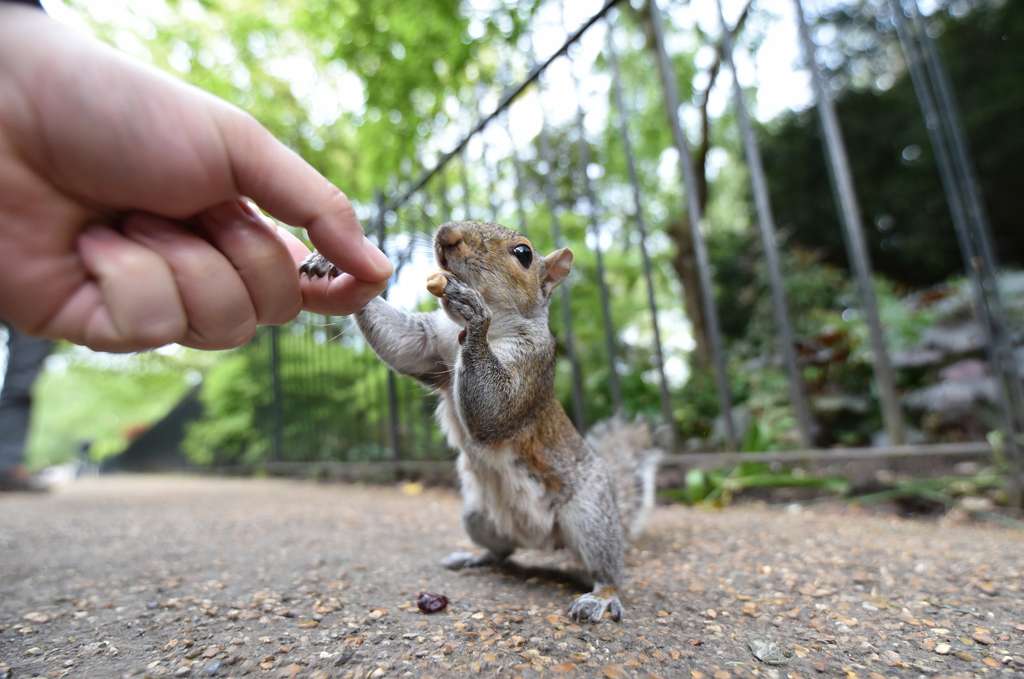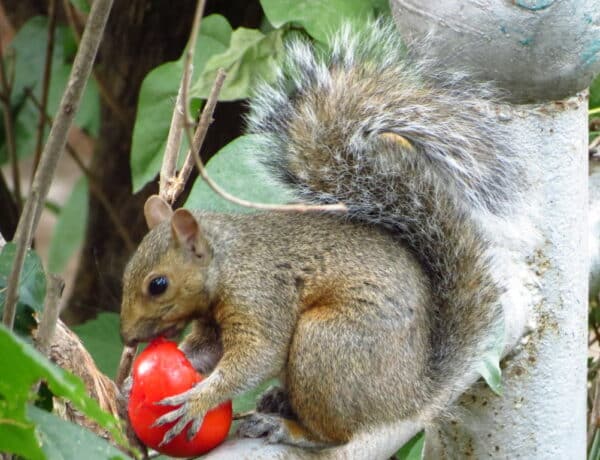Introduction
Are Squirrels Smart: This seemingly simple question opens the door to a fascinating exploration of the intelligence and behaviors of one of nature’s most ubiquitous and charismatic creatures. Squirrels tails are small mammals that belong to the family Sciuridae, and they are known for their acrobatic feats, fluffy tails, and seemingly boundless energy. While they may appear to be simply cute and nimble rodents scurrying about in our backyards and urban parks, a closer look reveals a remarkable array of cognitive abilities and adaptive behaviors that suggest these animals are far from being mere bushy-tailed automatons. Squirrels have evolved to thrive in a wide range of habitats, from dense forests to urban environments, and their intelligence has played a crucial role in their survival.
One of the most striking displays of their smarts is their ability to cache food. Squirrels bury nuts and seeds in various locations, creating a hidden treasure trove of sustenance for leaner times. What’s truly remarkable is their capacity to the precise locations of these caches, even when they are hidden beneath layers of snow or leaves. This demonstrates an impressive spatial memory, which is crucial for their survival during harsh winters. Squirrels exhibit problem-solving skills when it comes to accessing their cached food.
They have been observed using various techniques to open nuts or break into bird feeders, demonstrating adaptability and a capacity to learn from their experiences. This adaptability extends to their ability to exploit new food sources and adapt to changing environments, making them highly successful in both natural and human-altered landscapes. Squirrels are also known for their agility and quick reflexes, which they use to evade predators and navigate complex environments. Their leaping abilities, coupled with their keen sense of balance, enable them to move effortlessly through the treetops, performing breathtaking acrobatics as they leap from branch to branch. This agility is a testament to their finely tuned motor skills and spatial awareness.

Do squirrels remember humans?
Because of the animal’s intelligence and memory, it is not surprising it can remember friendly humans and those who offer food. Squirrels appreciate a predictable food source and will happily return again and again to the same individual.
Squirrels, particularly the Eastern gray squirrel found in North America, are known for their keen spatial memory. They use this ability to locate the caches of nuts and seeds they bury throughout their territory. Research has shown that they can the locations of hundreds of these caches, even months after they’ve buried them. This remarkable memory is essential for their survival, as it ensures they have a steady food supply during the winter months.
However, when it comes to individual humans, the evidence is less clear-cut. Squirrels are generally cautious animals, and their interactions with humans are often based on fear and perceived threats. They may scurry away or vocalize loudly to express their discomfort when they sense a human presence. Over time, they can become habituated to humans, especially if they are regularly with food.
Habituation is a process in which animals become less responsive to stimuli that are neither rewarding nor harmful. In the case of squirrels, if they associate humans with a consistent source of food without any negative consequences, they may become less fearful and more tolerant of human presence. This, however, doesn’t necessarily mean they individual humans in the same way they the locations of their food caches.
Are squirrels as smart as dogs?
In short, they are smarter than dogs and cats but not as smart as pigs. They are much less smart than dolphins, elephants and great apes. Maybe around as smart as marmosets or so. Pretty smart, though, and much smarter than most people think they are.
Problem-Solving: Dogs, especially some breeds, have demonstrated exceptional problem-solving skills. They can learn complex commands, perform various tasks, and adapt to a wide range of situations. Squirrels, on the other hand, are more focused on tasks related to their survival, such as caching food and evading predators. While both can solve problems within their respective domains, dogs often have a broader range of cognitive tasks they can excel in.
Dogs: Dogs are known for their strong social intelligence. They can understand human emotions, communicate with humans, and form intricate social bonds. Some dog breeds have been bred for specific social and cognitive abilities, such as herding or hunting alongside humans. Dogs have impressive learning and memory abilities. They can commands, routines, and even recognize individual humans and other animals.
Squirrels: Squirrels are generally less social animals, with their interactions primarily focused on mating and avoiding threats. While they can communicate with each other through vocalizations and body language, their social intelligence is not as developed as that of dogs.
Are squirrels smarter than rats?
How Is a Squirrel’s Intelligence Unique? Rodents are clever animals, but the squirrel tops the list for intelligence. Although a mouse or rat can outmaneuver and sometimes outsmart a pursuing human, squirrel’s agility and intelligence give them an advantage over other predators and larger creatures.
Squirrels are known for their impressive problem-solving abilities, particularly in tasks related to food caching. They can locate and retrieve their hidden food stores, even when they are concealed beneath layers of leaves or snow. This demonstrates a high level of spatial memory and problem-solving capability.
Rats are also skilled problem solvers. Laboratory studies have shown that they can learn to navigate complex mazes and solve puzzles to access food rewards. Rats’ problem-solving skills have made them valuable subjects in scientific research. Squirrels are generally less social animals.
While they may engage in mating and territorial interactions, they do not exhibit complex social structures or advanced social intelligence. Rats are highly social animals that live in colonies and exhibit sophisticated social behaviors. They can form intricate social hierarchies and display empathy and cooperation within their groups.
Can squirrels trust you?
In fact, squirrels are typically less afraid of human beings than they are of other animals. Squirrels not only recognize human beings; they also can be trained to come for food when it’s offered consistently.
Fear and Instinct: Squirrels are naturally wary of potential threats, and this instinctual wariness has served them well in their evolutionary history. This wariness extends to humans, as we are seen as potential predators. When a squirrel encounters a human, their immediate reaction is often to flee or take defensive actions such as vocalizing loudly or making rapid, evasive movements. This is not a sign of mistrust but rather a survival strategy.
Habituation: While squirrels are naturally cautious, they can become habituated to the presence of humans over time. Habituation is a process in which animals become accustomed to non-threatening stimuli that are consistently present. In the context of squirrels, if they frequently encounter humans who do not pose a direct threat, they may become less fearful and more tolerant of human presence. This doesn’t mean they “trust” humans in the way we trust friends or family; rather, they have learned that some humans are not immediate threats.
Feeding Relationship: In urban and suburban areas, squirrels often encounter humans who them with food. Squirrels are opportunistic foragers, and if they associate humans with a consistent source of food, they may approach humans for that reason. This behavior is not indicative of trust but rather a learned association between humans and a food source.
Are squirrels aggressive?
No squirrel species is aggressive by nature. However, they are wild animals and if they feel threatened by you or another animal, they may bite as a defense mechanism. Even domesticated pets attack if they feel unsafe. As a rule of thumb, you should know not to try and pick up wild animals, including squirrels.
Territorial Aggression: Squirrels are territorial animals, and they can become aggressive towards other squirrels that encroach on their territory, particularly during the breeding season. This territorial aggression is typically directed at members of their own species and is not aimed at humans. They may engage in chattering vocalizations, chasing, or even physical confrontations with rival squirrels.
Defensive Aggression: Squirrels are prey animals, which means they are constantly on the lookout for potential threats. When they perceive a human or another animal as a threat, they may exhibit defensive aggression. This can include vocalizing loudly, flicking their tails, and making bluff charges towards the perceived threat. These behaviors are meant to deter potential predators and do not necessarily indicate aggression in the human sense.
Protecting Young: Mother squirrels can be protective of their offspring. If a human or another animal comes too close to a nest with squirrel kits (young squirrels), the mother may become vocal and display defensive behaviors to protect her young. Again, this behavior is not aggressive in the sense of seeking to harm humans but is a natural response to perceived threats.
Do squirrels have feelings?
Although we normally don’t attribute human qualities to wildlife at the Cape Wildlife Center, by observing the animals we do believe they experience feelings. Squirrels appear to show happiness, curiosity, frustration, anger and fear.
Basic Emotions: Squirrels, like all mammals, have basic emotions that are essential for their survival and well-being. These emotions include fear, joy, and distress. When a squirrel encounters a threat, it may experience fear, leading to behaviors aimed at evading the danger. Conversely, when it finds a bountiful food source, it may experience joy, which is expressed through behaviors like energetic foraging.
Parental Care: Squirrels exhibit maternal behaviors that suggest a sense of care and protection for their offspring. Mother squirrels build nests, nurse their young, and warmth and shelter. These actions imply a level of attachment and concern for their offspring’s well-being.
Social Interactions: Squirrels are not solitary creatures and engage in social interactions with other squirrels. While their social structures are not as complex as some other mammals, their interactions include grooming, play, and sometimes even cooperation. These behaviors suggest the potential for social bonds and a sense of social well-being.
Should you touch a squirrel?
They May Bite or Scratch
Scratches and bites can also become infected, as these mammals carry bacteria on their coats, teeth, and claws. If you want to interact with a squirrel at a park or in your yard, leave the food where they can reach it but avoid touching any animal directly.
Respect for Wildlife: Squirrels, like all wildlife, have a right to live undisturbed in their natural habitat. Touching or handling squirrels can disrupt their daily routines, cause stress, and interfere with their ability to find food, care for their young, and carry out other essential activities.
Disease Risk: Squirrels can carry diseases, parasites, and ticks that can be transmitted to humans. Handling squirrels without proper protection can potentially expose you to health risks. In many regions, it is illegal to capture, possess, or harass wildlife, including squirrels, without the appropriate permits or licenses.
Squirrel Behavior: Squirrels are wild animals, and their behavior can be unpredictable when they feel threatened or cornered. Approaching or attempting to touch a squirrel can result in defensive behaviors, such as biting or scratching, which can lead to injury.
Risk to the Squirrel: Handling a squirrel can also be harmful to the animal. Their delicate bones and limbs can easily be injured if mishandled. Moreover, the scent of humans on a squirrel can mark it as a potential threat to other squirrels, leading to social isolation or aggression from its own kind.
Can squirrels eat meat?
Do Squirrels Eat Meat. Yes, as we mentioned above, squirrels are omnivorous so it’s not unusual to spot them eating some type of meat. Most commonly, ground squirrels consume meat in their natural habitat. Their diet includes small snakes, lizards, mice, insects, etc.
Natural Diet: In their natural habitat, squirrels are opportunistic feeders, and their diet is primarily herbivorous. They are well-adapted to foraging for nuts, seeds, berries, and plant material. These foods them with the necessary nutrients, energy, and dietary fiber for their daily needs.
Occasional Animal Matter: While squirrels are not carnivores, they may occasionally consume small amounts of animal matter for various reasons. This can include insects, bird eggs, or small vertebrates like baby birds. Such instances are generally opportunistic and may occur when other food sources are scarce. Squirrels may eat animal matter to supplement their diet with protein or other nutrients they might be lacking.
Calcium and Nutrient Needs: Squirrels, like many animals, require calcium for healthy bone and teeth development. In some cases, they may consume small bones, such as those found in bird eggs, as a source of calcium. However, this behavior is relatively rare and typically occurs when the opportunity arises.

Conclusion
Through our exploration of squirrel intelligence, we have uncovered a multitude of fascinating traits and behaviors that underscore their remarkable cognitive abilities. Squirrels’ capacity for spatial memory, exemplified by their ability to locate hidden caches of food, speaks to their adaptability and foresight. This skill is not only a testament to their individual intelligence but also highlights their role as ecosystem engineers, as they unintentionally aid in the distribution of seeds, contributing to forest regeneration. Their problem-solving skills and adaptability in accessing food sources demonstrate a remarkable capacity to learn from their surroundings.
Whether it’s cracking open a stubborn nut or outsmarting a squirrel-proof bird feeder, squirrels exhibit a level of ingenuity that reflects their ability to adapt to changing squirrels flying circumstances. The squirrels’ agility and acrobatics, which allow them to traverse complex environments with ease, showcase their impressive motor skills and spatial awareness. Their swift reflexes and balance help them evade predators and navigate the canopy, emphasizing the interconnectedness of their physical and cognitive abilities. Squirrels’ social intelligence, manifested in their communication and group dynamics, adds another layer to their overall intelligence.
Their ability to assess the intentions of their fellow squirrels and engage in cooperative behaviors underscores the importance of social cognition in their survival and success as a species. Scientific research into squirrel intelligence continues to uncover new facets of their cognitive abilities, challenging our preconceived notions about these often-overlooked animals. As we gain a deeper understanding of their intelligence, we also gain a greater appreciation for the intricate web of life that surrounds us.





No Comments